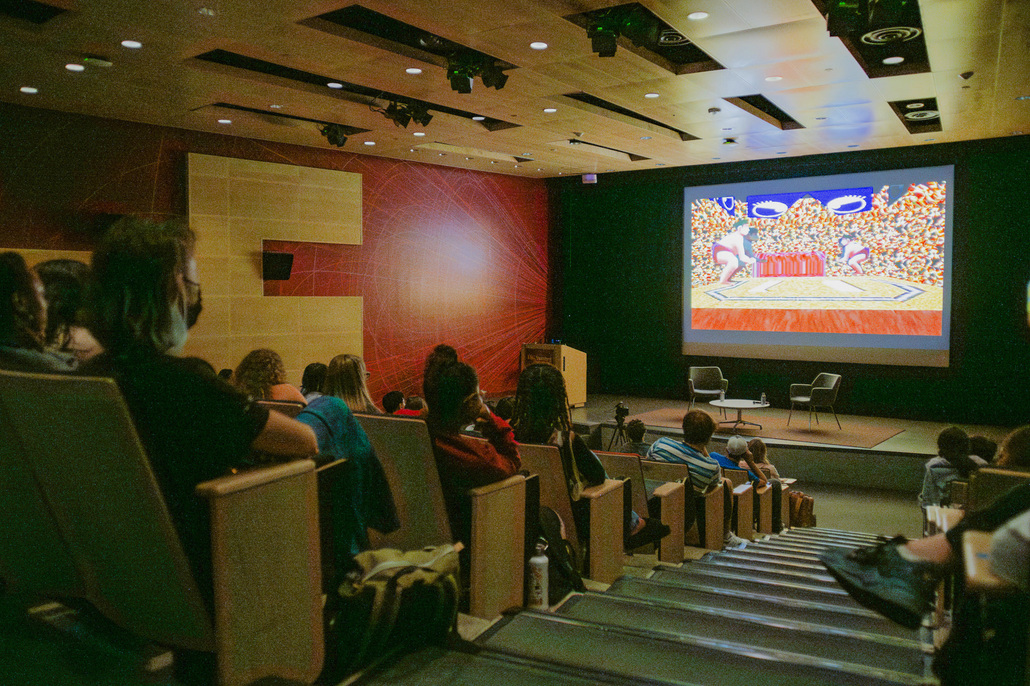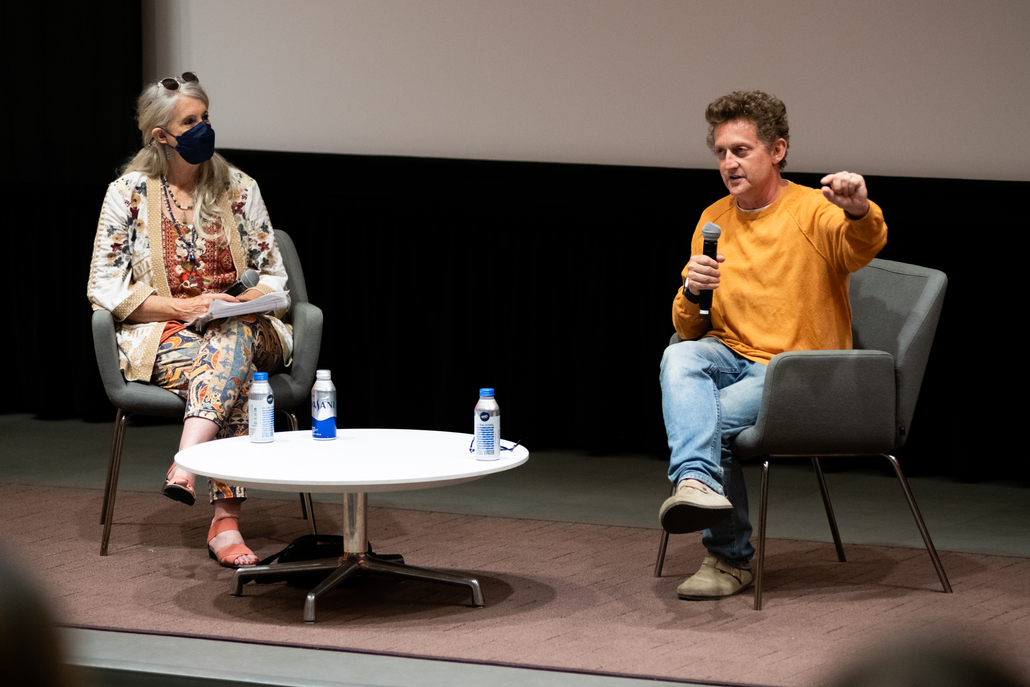Taking a look at YouTube’s unique, complex history
Alex Winter screened his new documentary at Wallis Annenberg Hall Monday.
Alex Winter screened his new documentary at Wallis Annenberg Hall Monday.

Amid heated debates about artificial intelligence and the future of communication policy, Alex Winter’s new documentary “The YouTube Effect” brings a new voice to the fray. The Center on Communication Leadership and Policy screened the film at Annenberg Hall Monday evening, followed by a Q&A with the writer and director.
Winter, best known for his portrayal of Bill S. Preston in “Bill & Ted’s Excellent Adventure” (1989), created the film to chronicle how YouTube grew in prevalence in the last 18 years since its launch in 2005. The documentary not only gave a brief history of YouTube, but also brought to light the complex conversations about algorithms’ potential ability to change minds.
The film features notable former YouTube employees, including co-founder Steve Chen and former CEO Susan Wojcicki. Other cast members included YouTubers Natalie Wynn, Brianna Wu and Anthony Padilla, who were pivotal in unpacking the cultural shifts as a result of YouTube becoming a major media source.
Owen Foster, a junior fellow at the CCLP, said the organization was excited for the opportunity to screen the film.
“Our center focuses a lot on policy communication, and we’re doing two studies on social media disinformation,” Foster said. “Due to the fact that [“The YouTube Effect”] was a great movie that talks about these issues, we’re really glad to have them. We were really pleased with the turnout.”
In a quick introduction before the screening, Winter said the film focuses on “the parasocial relationship between the user, which is you on one end of YouTube, looking into your webcam, and the person on the other end.”
The documentary addressed YouTube’s enduring power in today’s culture, spanning from issues on echo chambers to the average viewer’s experience with the rabbit hole effect. Winter helped contextualize the importance of considering how algorithms are used to monetize views and the chaos that can ensue when major news sources aren’t criticized.
“It’s pretty interesting how they depicted [YouTube] and how you can base your whole mindset off of watching just simply videos that everyone else posts,” said Jenna Gallaway, an undeclared freshman. “[YouTube is] trying to progress it in terms of making the algorithm better.”

During the Q&A, Winter addressed how the government has faced similar issues of writing legislation in order to create a safer environment for the consumer. Winter qualified his own beliefs on tech regulations, breaking down common misconceptions about his approach to consuming media.
“I’m actually tech agnostic,” Winter said. “I’m more of a pro-tech person, so a lot of the founders that I’m with are very pro-privacy, anti-surveillance, pro-citizens rights, and anti-too much regulation that would actually kill the internet.”
The film explores how Gen Z has turned to YouTube as a source of critical information. As generations of humans begin to use the information found on unregulated media platforms to form their beliefs, algorithms can become dangerous. Winter said he thinks that with the approaching 2024 presidential election, YouTube will once again play a pivotal role.
“The fact is that there’s a lot of room for freedom and privacy and safety online,” Winter said. “There’s a lot of reasons for that, and so the law is a free-for-all and [there is] a rise of anti-democratic governments around the world taking great advantage of the complete lack of basic standards and practices.”
Vishal Billa, a senior majoring in electrical and computer engineering who attended Monday’s screening, said he found the documentary “super interesting” from a technological perspective.
“I come at this from an engineering mindset, like there’s a solution to the problem,” Billa said. “It’s some technology that no one’s come up with yet … It was really interesting to see what sort of things contributed to this problem, like regulatory things, human issues and also engineering problems.”
The screening ended with an impactful Q&A session on Winter’s cinematic process. The audience gained insight into the multifaceted debate surrounding YouTube algorithms and restrictions and wrestled with the role legislation has in the development of media and influence. As YouTube becomes more important, the film concludes, the platform will become what we make of it.
“YouTube is a repository for basically all of recorded human history. It is essentially our library of Alexandria,” Winter said. “Every conceivable piece of recorded media that has ever existed can be found on YouTube.”
We are the only independent newspaper here at USC, run at every level by students. That means we aren’t tied down by any other interests but those of readers like you: the students, faculty, staff and South Central residents that together make up the USC community.
Independence is a double-edged sword: We have a unique lens into the University’s actions and policies, and can hold powerful figures accountable when others cannot. But that also means our budget is severely limited. We’re already spread thin as we compensate the writers, photographers, artists, designers and editors whose incredible work you see in our daily paper; as we work to revamp and expand our digital presence, we now have additional staff making podcasts, videos, webpages, our first ever magazine and social media content, who are at risk of being unable to receive the compensation they deserve.
We are therefore indebted to readers like you, who, by supporting us, help keep our paper daily (we are the only remaining college paper on the West Coast that prints every single weekday), independent, free and widely accessible.
Please consider supporting us. Even $1 goes a long way in supporting our work; if you are able, you can also support us with monthly, or even annual, donations. Thank you.
This site uses cookies. By continuing to browse the site, you are agreeing to our use of cookies.
Accept settingsDo Not AcceptWe may request cookies to be set on your device. We use cookies to let us know when you visit our websites, how you interact with us, to enrich your user experience, and to customize your relationship with our website.
Click on the different category headings to find out more. You can also change some of your preferences. Note that blocking some types of cookies may impact your experience on our websites and the services we are able to offer.
These cookies are strictly necessary to provide you with services available through our website and to use some of its features.
Because these cookies are strictly necessary to deliver the website, refusing them will have impact how our site functions. You always can block or delete cookies by changing your browser settings and force blocking all cookies on this website. But this will always prompt you to accept/refuse cookies when revisiting our site.
We fully respect if you want to refuse cookies but to avoid asking you again and again kindly allow us to store a cookie for that. You are free to opt out any time or opt in for other cookies to get a better experience. If you refuse cookies we will remove all set cookies in our domain.
We provide you with a list of stored cookies on your computer in our domain so you can check what we stored. Due to security reasons we are not able to show or modify cookies from other domains. You can check these in your browser security settings.
These cookies collect information that is used either in aggregate form to help us understand how our website is being used or how effective our marketing campaigns are, or to help us customize our website and application for you in order to enhance your experience.
If you do not want that we track your visit to our site you can disable tracking in your browser here:
We also use different external services like Google Webfonts, Google Maps, and external Video providers. Since these providers may collect personal data like your IP address we allow you to block them here. Please be aware that this might heavily reduce the functionality and appearance of our site. Changes will take effect once you reload the page.
Google Webfont Settings:
Google Map Settings:
Google reCaptcha Settings:
Vimeo and Youtube video embeds:
The following cookies are also needed - You can choose if you want to allow them:
